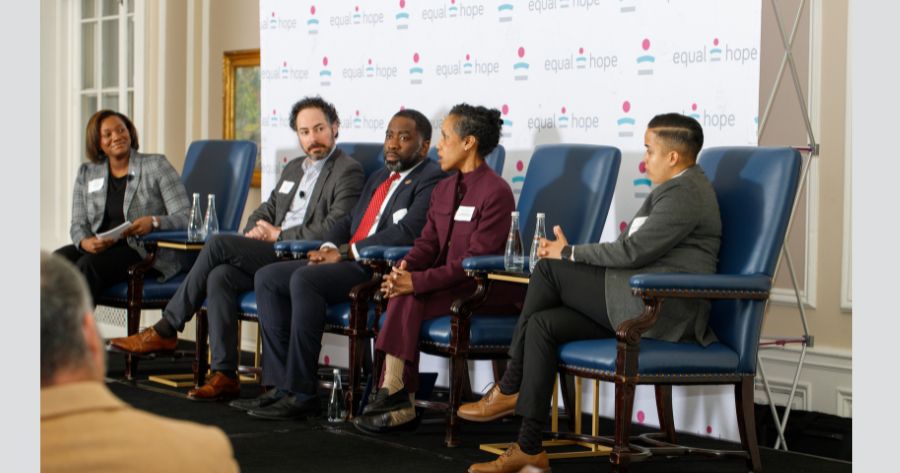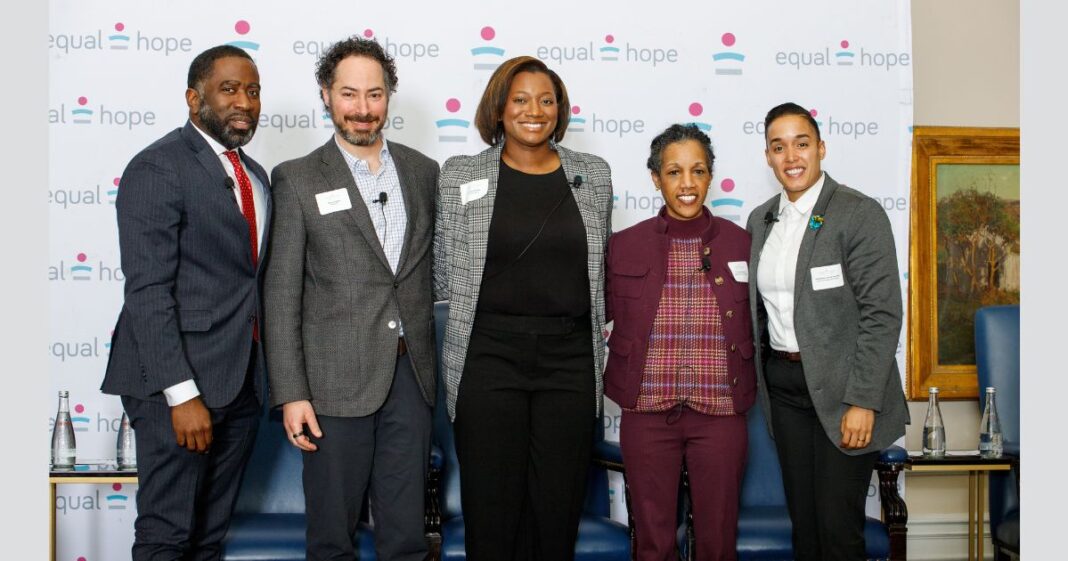Panelists at the Equal Hope Health Equity Breakfast (left to right): Illinois State Rep. Marcus C. Evans Jr., MATTER CEO Steven Collens, Equal Hope CEO Dr. Paris Thomas, Equal Hope Board President Dr. Patricia Robinson, and 26th Ward Alderperson Jessie Fuentes (Photo courtesy of Equal Hope).
“Our work has already led to significant progress. Chicago now leads the nation in reducing breast cancer mortality differences among Black women. However, as we gather Today, I must acknowledge the challenges we face in this rapidly changing political landscape. New obstacles threaten our ability to serve the communities that rely on us, stated Paris Thomas, CEO of Equal Hope and moderator for the panel discussion.
A part of the Equal Hope mission statement is “Equal Access, Equal Care, and Equal Voice.” The organization held a breakfast on April 1 at The Union League Club (65 W. Jackson Blvd.} to discuss solutions that the team and community could work together to continue making progress in saving lives, securing funding and fighting to ensure everyone receives the same opportunities in healthcare.
The key panelists leading the discussion on health equity were moderator Dr. Paris Thomas, CEO of Equal Hope, and Steven Collens, CEO of MATTER, a healthcare incubator supporting over 1,000 healthcare startups. He is also a member of Mayor Brandon Johnson’s Council on Technology and Innovation.
State and City Officials Share Bold Visions for Health Equity
During the breakfast, State Rep. Marcus C. Evans Jr. strongly advocated for increased healthcare and cancer research funding.
Ald. Jessie Fuentes (26th) focused on community development, criminal justice reform, and affordable housing. Dr. Patricia Robinson, president of Equal Hope’s Board of Directors, stated her dedication to improving health equity and positively impacting countless lives through her clinical and advocacy work.
Exposing the Root Causes of Health Disparities
Health disparities and health inequities are issues that Black and Brown communities face, which are influenced by factors beyond healthcare. Doctors often use different approaches or responses depending on the patient’s race and financial status.
“We also need to understand the impact of social determinants of health—factors like where you live, your access to healthcare, and your economic status, which can affect outcomes more than the clinical care you receive. The unfortunate reality is that social determinants of health disproportionately affect Black and Brown communities, contributing to the disparities we see in health outcomes,” said Dr. Robinson.
The panel also agreed that supporting legislation to improve healthcare access is necessary, particularly for marginalized communities. They highlighted the importance of keeping safety-net hospitals open and providing healthcare services directly to the community, such as free screenings and preventive care, to address health disparities and support those in the greatest need.
Innovation and Entrepreneurship Drive Solutions
Collens also highlighted that some of these companies are leading in promoting health equity and supporting the initiatives discussed Today.
“Since its inception, MATTER has supported healthcare startups through incubators and three-month accelerator programs focused on specific healthcare needs. While not all programs are solely about health equity, many contribute to it, such as those targeting maternal mortality and innovations to support solutions that reduce barriers, improve access and enhance health outcomes.”
The Fight for Funding in a Shifting Political Landscape
Due to significant funding cuts, many of the organization’s resources and outreach efforts have been severely impacted, forcing them to scramble to address the urgent needs in underserved communities.
Thomas added, “Today’s event is more than just a conversation; it’s a call to action. As donors, advocates, and change-makers, you have the power to help us navigate these turbulent times and sustain our fight for health equity. Together, we can ensure that Equal Hope continues to break down barriers and save lives.
Evans also stated, “The challenges we face are nothing new; they’ve been part of the political landscape for a long time.”
“What matters now is how we respond. The disregard for the health and survival of Black and Latino communities has been systemic, and it’s time for that to change,” he said.
In Illinois, efforts are underway to secure funding for vital health equity programs. With potential Medicaid cuts, state leaders are focused on protecting and increasing human services funding, including health equity initiatives. Illinois allocates nearly $8 billion annually to these services, aiming to support the most vulnerable communities. Strategies like federal matching funds and alternative revenue sources are being explored to ensure continued care for underserved populations.
Personal Journeys Fuel Advocacy for Systemic Change

Equal Hope Health Equity Breakfast panelists (left to right): Dr. Paris Thomas, CEO of Equal Hope; Steven Collens, CEO of MATTER; State Rep. Marcus C. Evans Jr.; Dr. Patricia Robinson, Board President of Equal Hope; and Alderperson Jessie Fuentes of Chicago’s 26th Ward (Photo courtesy of Equal Hope).
Evans, a cancer survivor, and Fuentes, who has Type 1 Diabetes, shared personal testimonies that influenced their work and advocacy in the health equity space. Their experiences have deepened their understanding of healthcare disparities and underscored the importance of self-advocacy in the fight for health equity.
Evans said his turning point came when he was struggling to breathe due to tumors pressing against his esophagus. At his lowest point, he confronted his doctor about his initial diagnosis. After the doctor reluctantly agreed to run tests, the results revealed a more serious condition.
“I can remember when doctors told me multiple times that I had asthma,” Evans said.
“They looked me in the face and told me to take asthma medication, and I’d be fine. Even my family believed that. They said, ‘Marcus, just take the medicine; you’ll be okay.’ But I didn’t believe that. I had to become my advocate.”
He added, “It’s not just about surviving cancer; it’s about surviving the failures of our healthcare system.”
Fuentes shared that she was diagnosed with Type 1 diabetes at 20 years old after passing out during a lunch break and waking up in the hospital. She was told she had diabetes, but at the time, she didn’t fully understand what it meant or what it meant to be insulin dependent and lacked access to proper healthcare to manage the condition.
“I remember getting my first pharmacy bill, $500, and thinking, ‘I can’t do this.’ I couldn’t afford the medication I needed, and I had to figure out another way.”
Fuentes shared that, despite being a college graduate and community organizer, she struggled to trust the healthcare system, feeling that paying that much for medication was unjust.
She also highlighted similar challenges faced by many Latinos in Chicago and across the U.S., such as language barriers, a lack of understanding about medical diagnoses and the absence of culturally competent care in their communities.
Her vision for health equity in Chicago, especially in the 26th Ward, is one where access to quality healthcare is not determined by skin color, zip code, or income, and ensuring young people are prepared for the future.
Evans also stressed that a meaningful solution involves educating the community and providing young people with training, educational opportunities, and job prospects to enter healthcare, enabling them to serve their local communities and the nation.
“Addressing health equity requires a multi-pronged approach. We must engage and inspire young people in our community to pursue healthcare careers, ensuring more Black and Latino individuals are represented in the workforce, so patients see providers who look like them,” he said.
Equal Hope’s Lifesaving Legacy and Future Vision
Equal Hope, founded in 2008, was established to address the alarming disparity where Black women in Chicago were 62% more likely to die from breast cancer than their white counterparts. This gap results from systemic inequities in care and access, not biology. Equal Hope works to eliminate health inequities by focusing on breast and gynecological cancers, reproductive justice, and access to clinical trials.
The organization also supports underserved communities with transportation, system navigation, and culturally competent outreach. Their mission is to break down barriers and save lives.
Dr. Robinson expressed how Equal Hope will continue to help despite the challenges faced by the healthcare system. “A critical gap between the patient and the physician needs to be addressed. Closing that gap is what Equal Hope is all about.
Equal Hope is preparing for its annual “Celebration of Life” benefit on June 5, at Venue West. This event will commemorate 17 years of impact, reaching over 700,000 individuals and providing vital screenings at no cost.
For more information, visit equalhope.org to stay engaged with their efforts and continue amplifying the fight for health equity.



